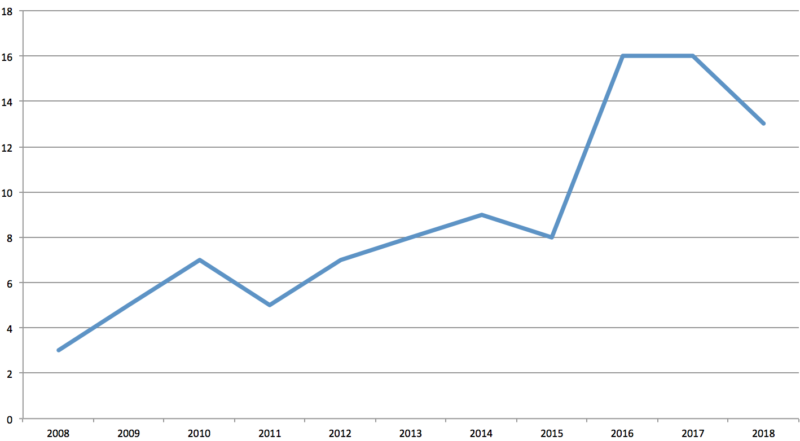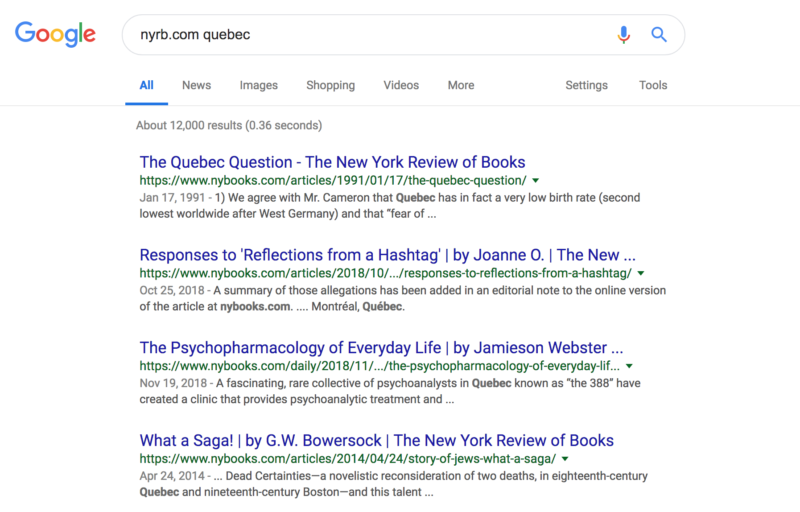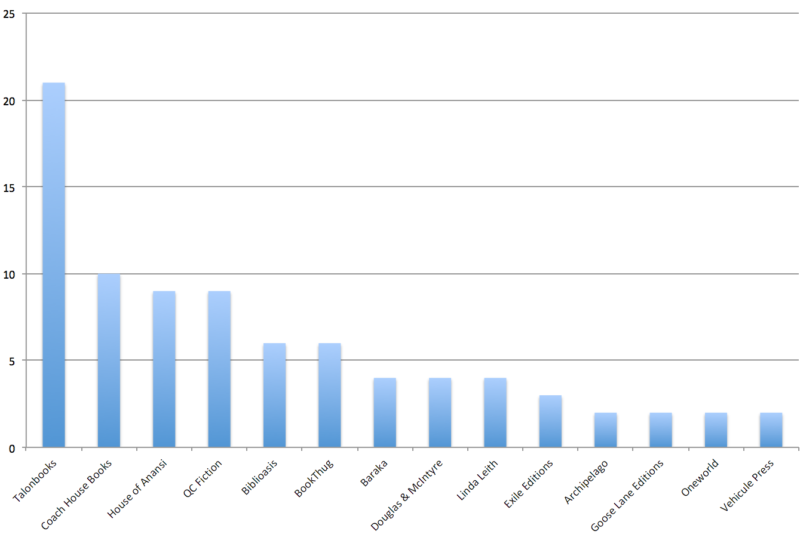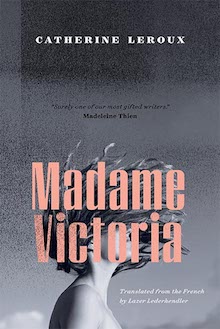Maybe These Days Will Be Over, Over Soon
Man, Three Percent is on a Canadian kick as of late. We podcasted with Kevin Williams of Talonbooks. We ran a review of Mama’s Boy by David Goudreault. And now this post. It’s as if I were 25% Canadian or something! (Fun fact: I actually am.)
Oh, Canada. That country Americans remember exists every time we elect a fascist.
I do actually want to try and write about Catherine Leroux’s stunning Madame Victoria (a finalist for zero U.S.-based translation awards this year) and David Turgeon’s incredibly fun The Supreme Orchestra (also zero longlist appearances)—or at least want to try and convince you to buy these—but first I want to have some fun with charts and numbers!

According to the Translation Database—which, yes, I know you can’t access it right now, but that’s because someone/thing/group/Country? was using it to launch a DDOS attack on Publishers Weekly‘s website, which, NOT COOL—there were 97 works of Quebecois fiction published and distributed in America since 2008. Which is behind Argentina (124), tied with Israel (99), and slightly ahead of Brazil (91). Good showing!
(Putting this into imaginary sabermetrics of publishing terms, and given that the average books created [BC] per country between 2008-2018 is 36.07, then, in terms of BC+ in which 100 is average and higher equals more, Quebec comes is hard with a 274 BC+. Cool. Yeah. I’ll let myself out . . . )
Two observations: 1) this is some really steady growth for books from Quebec making their way into the U.S., and I have no idea why that really is, but I applaud it; and 2) what happened in 2016? Sure, QC Fiction started publishing that year, but they didn’t do eight books. For whatever reason—bad data? Consortium signing on more Canadian presses? a few Quebecois hits?—the number of titles from Quebec doubled between 2015 and 2016. Not that 16 books is an astonishing amount or anything (although it is good for an incredible 487 BC+ . . .), but it’s something worth noting.
*
Actually, that should be the title of this post: THE 20 HOTTEST AUTHORS FROM THE HOTTEST NEW TREND IN INTERNATIONAL PUBLISHING! GET YOUR QUEBECOIS LIT NOW AND IMPRESS YOUR FRIENDS.
Which makes me wonder: How many literary websites cover Quebecois literature with any degree of frequency? Let’s do some Googling.



[Note: Louise Penny is from Quebec, but writes in English.]


I’m not sure that Three Percent has been much better. (Although three articles plus some reviews isn’t the worst.) If you really want to know about Quebecois writers and publishers, go to Asymptote and Words Without Borders. (Duh and or obviously, I know.) Or, if you want to drink from the source, check out Quebec Reads.
*
This post is already a bit childish, and I can’t promise that it’s not going to get worse. I want to put my snarky ways behind me, I want these days to be over, but I’m stuck in a juvenile rut, raging against awards like a sore loser and spitting from a distance at the giants of the literary internet. Why? It always has been fun to craft fun takedowns and bitter jokes. And raging at the world because it doesn’t have to be like this (can we please decide that rather than letting one bad thing open the doorway for everything to be bad we can just isolate that mistake and make sure it doesn’t happen ever again?) comes as much from a place of idealism as an attempt to destroy.
And yet, I know that all year I’ve been poking at LitHub—a site people actually visit, like 200,000,000 of them a month, if, if you believe their stats (sorry, just exaggerating because I’m a child)—for their dumb lists and the “Rotten Tomatoes” aspects of BookMarks. And why? Jealousy? Because they’re an easy target? Just to make bad jokes? Yep. All true.
But we’re three posts away from abandoning this year-long project and moving on to a reimagined Three Percent. Now with 50% fewer insults!
That said, there’s something about books and reading that will always remain childish to me. Maybe it’s because I spent 99% of my childhood in a treehouse alone reading literally any text I could get my hands on. (I once read a series of manuals on how to program in BASIC because they were there.)
I’d like to think it’s more though.
As snooty as I am about books, there is always an atavistic aspect to my reading. For a lot of people, a similar itch is scratched by “strong plots” and “recognizable characters” and the feeling of escaping your current life. (Is anyone’s current life as glorious as they hoped it would turn out?) Escape is a rather juvenile emotion.
Maybe I want to promote puzzle-books and texts that make you mentally work because I want to feel superior.
Maybe I want to promote puzzle-books and texts that make you mentally work because there’s a huge joy to be had in figuring things out.
Maybe I want to promote puzzle-books and texts that make you mentally work because elitism.
Maybe I want to promote puzzle-books and texts that make you mentally work because no one else seems to be doing this anymore.
These columns shouldn’t be about me, I know, but I just spent a year reading over 100 titles, almost all new works in translation, just to get a broader sense of what international writing is being published and how it’s all being received and digested.
And I didn’t exactly enjoy it.
*
Every time I hear a mean joke about being Canadian, I go to the hospital and get my feelings checked for free.
Canadian jokes are pretty much the worst. I thought I could find a lot of semi-offensive, funny ones, but this and this and this? I’m starting to lose my respect for our northern neighbors! Seriously, this?
Q: How many Newfoundlanders does it take to fix a toilet?
A: Wait, when did they get indoor plumbing?
C’mon. Even us Poles have better digs than that.
*
Who publishes Quebecois authors in translation?

I left off all the presses that did one Quebec book over the past eleven years from this chart. The majority seem to be one-offs anyway, Akashic’s Montreal Noir, a Dalkey book, books from Shambhala and Soft Skull, etc. Most of all the presses listed in that chart (Archipelago and their Jacques Poulin and Oneworld and their Denis Theriault titles aside) are based in Canada. Where there is government funding to translate Quebec lit—on top of a lot of other government monies for publishing in general—and where you would assume there would be a greater interest in books from fellow Canadians than here in the United States.
But that’s wrong and based on bad assumptions.
On the factual side of things, a couple publishers on the list above told me they sell more copies of their Quebecois titles here in the States than in Canada.
And why wouldn’t Americans be interested in authors from Quebec? As readers we’ve (theoretically) become more open to literature in translation, thanks to Words Without Borders, the National Book Foundation, ALTA, and many other champions of international writing. Population-wise, we could easily take over Canada if every citizen disgruntled with Trump were to emigrate. Even as a numbers game, America should buy more Quebecois books than Canadians. (Is this where I should say “suck it, Canucks! We’re more open-minded!” No? OK. Never mind. That’s soooo juvenile. Writing about literature isn’t like playing the PS4.)
But, let’s play a game. Be honest and read through this list of names and skip to the next paragraph when you recognize one of them. (If you’re semi-invested in Canadian culture, then stop when you hit a name of an author you’ve read. If you’re P. T. Smith, well, don’t play.)
Nelly Arcan
Philippe Arseneault
Francois Barcelo
Jean-Philippe Baril Guerard
Camille Bouchard
Stephane Bourguignon
Louis Carmain
Veronique Cote
Martine Delvaux
Martine Desjardins
Claudine Dumont
Alain Farah
Jean-Michel Fortier
Joanna Gruda
Dany Laferriere (OK, skip away)
Bertrand Laverdure
Patrice Martin
Eric Plamondon
Monique Proulx
Dominique Scali
Larry Tremblay
Elise Turcotte
Melissa Verrault
If you’ve read more than one-quarter of those authors, please email or call or text me. I want to talk to you and learn.
*
One last personal reflective section, then, I promise, we’ll talk about books.
(I probably shouldn’t have made a “Juvenilia” Spotify playlist to listen to while I write this, although, to be honest, I love all these songs and all the emotions associated with them.)
This morning’s Two Month Review live videocast was not my best moment. I want to live in a world in which I use that phrase—”not my best moment”—less than once a month. OK, fair. Less than once a week.
Apologies all said and aside, there is something in my frustration that I can’t let go of. I honestly feel like back in the day, back before the World Wide Web conquered our every waking second, our imaginations, our ability to communicate and connect, it was easier to find subcultures that saw the value in “difficult” art and promoted it widely—not as an alternative to “good,” “readable,” “digestible” art, but as something everyone could get into with the right set of friends. Or right set of words, perhaps in a publication, conveyed in the right sort of way.
Context, the Dalkey Archive publication I helped work on when I was there, and distributed for free through Quail Ridge Books before I left the selling side for the producing one—Context was that publication in so many ways. Sure, I’m a fan of LARB and Quarterly Conversation and NYRB and whatever. All great, great. Still, I miss the free quarterly publication that was unflinching in its dedication to obscure, challenging authors whose works are so rewarding if we redirect our focus from sales and buzz and twee covers and who we know.
I’m probably wrong, but I feel like there are whole generations of amazing authors that are totally unknown these days. Writers like Gilbert Sorrentino. Kathy Acker. Others.
God, I’m getting old. (And all the lyrics in “Silver Moons”—currently playing!—are slaying me.)
*

Madame Victoria by Catherine Leroux, translated from the French by Lazer Lederhendler (Biblioasis, 6 Quebecois titles since 2008)
I’m pretty sure that, if I were to ask our new marketing director what the cool kids say about books they like these days, he would reply with “gif.”
I’m literally punching myself in the face.
So, anyway, here’s the logline for Madame Victoria:
In modern-day Montreal, a skeleton is uncovered in the woods behind the Victoria hospital. No one knows, and no one claims, the body. It’s nicknamed “Madame Victoria” and becomes a legend of sorts. Scientists know a few things about her life—she moved a number of times, etc.—but it takes the imagination of Catherine Leroux (The Party Wall, which, Chad interjection here, I’m so fucking psyched to read) to really bring Victoria to life.
Over the course of twelve different vignettes, Leroux explores an incredible variety of possibilities for who Madame Victoria was and how she ended up there. To go hyperbolic: This book is like looking at a quantum cloud of possibilities. I know Dan Wells (publisher, Biblioasis, stand-up dude, which, if I’m at all in touch with the youth, is not a phrase anyone uses) likes to compare this to the Goldberg Variations, which also makes sense given that certain things recur—”Eon,” which sometimes appears as a whiskey (YES!), sometimes as a person (BOO), or the appearance of a character with eyes of different colors—in new patterns time and again.
The fact that these stories are set in a variety of times, including a man who becomes Victoria, veer off into the supernatural, and never become staid or predictable—that’s a feat.
I’m willing to bet that 1000% more readers of this post have read Jenny Erpenbeck’s End of Days than knew five authors on the list above. Here’s a hot take for you: Madame Victoria is the book End of Days wishes it was. BOOOOOOM!
For me, the Erpenbeck book—which I quite like—is too rigorous with its intent. Once you know the pattern, nothing new happens. It’s a bit too formulaic, as if structure were all you needed to write a book. (If that were true, I would be cranking out words on something that maybe some foolish publisher would publish!)
Madame Victoria is so much more imaginative. Leroux lays down her thesis, her structure right from the start and then innovates in ways that the Erpenbeck book never does. Madame Victoria is jazz to The End Of Days‘s house beats.
Buy it. If you don’t like it/see the craft, let me know and I’ll give you a free Open Letter book in its place. Three if you buy it from Riffraff.
*
That “Juvenilia” playlist? Well, “I used to be carried in the arms of cheerleaders.”
*

The Supreme Orchestra by David Turgeon, translated by Pablo Strauss (Coach House Books, 10 Quebecois titles since 2008)
The paper in every Coach House book is so sexy.
But also, if you like Jean Echenoz, you NEED NEED NEED to buy this book.
I’m not going to give away the plot at all here, because it’s a book that deserves to tell itself, but I will say that as you unpuzzle this, you’ll see that it’s not an unusual plot—at least in relation to other spy novels—but that it is rearranged in an interesting way.
And what a jaunty tone of writing! It’s that tone that reminds me of Echenoz. It’s playful. Funny. Strange characters. A bit off-kilter in a sexy way. I devoured this book.
I’m not going to tell you what “the supreme orchestra” is—it might be a big band, it might be a country, it might be a jewel, it might be a plot—because I think you owe it to yourself to check this book out.
*
I don’t want to abandon this tone. This freewheeling-ness that’s both overly earnest and too honest and embarrassed and yes—juvenile. It’s too fun.
But it’s almost time.
Next week: Regions.
Last week of 2018: A list to end all lists.
If you’ve read all of this? Thanks. Go buy some books.



[…] December, when I was working on this post about Quebec fiction, I came up with the idea of having themed months running throughout 2019. Which is why January was […]